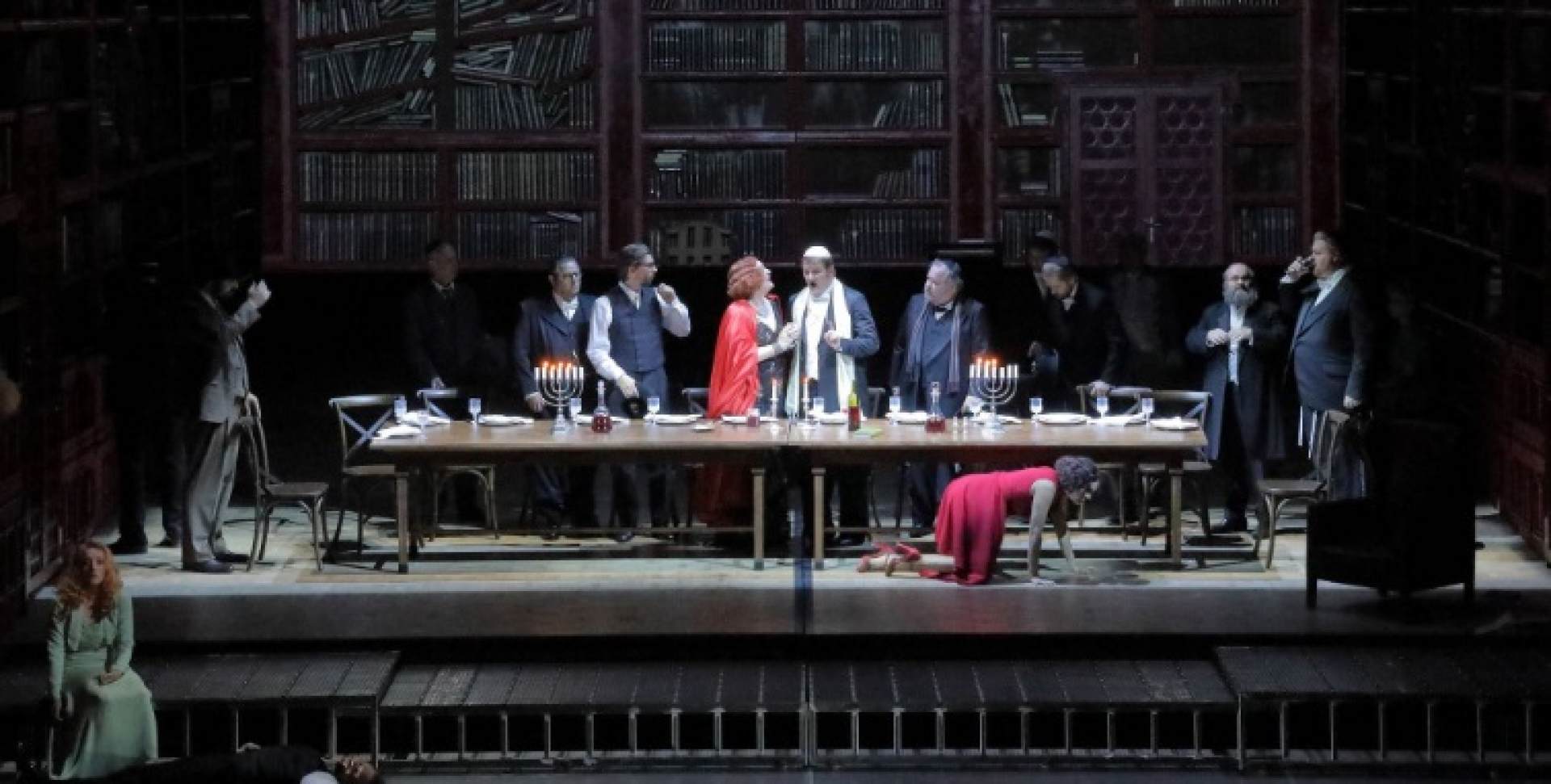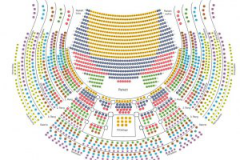Salome
Mo | Tu | We | Th | Fr | Sa | Su |
Musical drama in one act based on Oscar Wilde's poem of the same title (1905)
recommended for 16 years and older
In German. With German and English surtitles.
"The secret of love is greater than the secret of death" (Salome)
"How beautiful Princess Salome is tonight!". Oscar Wilde's French drama, arranged as opera text by the composer himself, was a stroke of genius of the fin de siècle, a scandal on one hand and an absolute hit on the other, both an artistic and a financial success which allowed Richard Strauss to buy his villa in Garmisch. Salome demands the head of the prophet, John the Baptist, who has rejected her, from her lustful stepfather – and bound by an oath, he cannot deny her. And so the zealous admonisher dies, and with him the princess is undone – "Kill this woman!". Krzysztof Warlikowski is convinced that Salome recounts many of the contradictions of the period of origin, that in this piece, however, much is also dismissed of that which at the time was still the future: "It's not just what's in the work of art itself that is important, whether it be Oscar Wilde or Richard Strauss, but rather the whole context, which Christianity and the history of the 20th century add to this piece."
Synopsis
Salome can no longer bear her stepfather Herod’s party, yet there is no escaping his house. In her distress, she appears especially beautiful to Narraboth, who can barely keep his eyes from her. The voice of a man imprisoned by Herod catches Salome’s attention. This man, known as Iokanaan, prophesizes the end of the world and the dawn of a new age. Salome convinces Narraboth to defy Herod’s orders and arrange a meeting for her with Iokanaan. He denounces the corruption of Salome’s family; however, his morally-harsh admonishments only serve to increase her interest in him, rising to a sexual desire that Iokanaan strongly rejects. Narraboth, who witnesses this interaction, takes his own life. Iokanaan advises Salome to seek salvation and redemption in Christ. Instead, she continues to press for carnal relations, and he curses her repeatedly. Salome is left distraught.
Herod is looking for Salome and finds Narraboth dead, filling him with the fear of possible doom. In front of his wife Herodias’ eyes, he unashamedly flirts with her daughter. Iokanaan’s vociferous condemnation of Herodias and her vicious moral conduct ignite a discussion amongst those present about the alleged prophet, and the questions of whether and how God will appear. As Iokanaan appeals for Herodias’ misdemeanours to be severely punished, she loses control of herself and demands that Herod gag him. As if unaffected by this, Herod wishes to see Salome dance and promises her the fulfilment of every imaginable desire in return. Against her mother’s will, she agrees.
She dances as if her life depends on it.
Afterwards, she requests Iokanaan’s head as her reward. Herod has qualms about killing a man he views as holy. Salome, however, refuses all her stepfather’s other offers and demands he keep his word. Herod relents. He orders Iokanaan be killed and his head brought to Salome.
Salome attempts to understand love and death, and kisses Iokanaan’s mouth. For a moment, she believes she has triumphed over him, but then realises her own death is approaching.
Program and cast
Duration est. 1 hours 45 minutes
Conductor: Thomas Guggeis
Director: Krzysztof Warlikowski
Production Assistant: Marielle Kahn
Stage Designer: Małgorzata Szczęśniak
Lighting: Felice Ross
Video: Kamil Polak
Choreographer: Claude Bardouil
Dramaturge: Miron HakenbeckMalte Krasting
Herodes: Gerhard Siegel
Herodias: Claudia Mahnke
Salome: Asmik Grigorian
Jochanaan: Wolfgang Koch
Narraboth: Joachim Bäckström
Ein Page der Herodias: Avery Amereau
Erster Jude: Ya-Chung Huang
Zweiter Jude: Tansel Akzeybek
Dritter Jude: Frederick Ballentine
Vierter Jude: Kevin Conners
Fünfter Jude: Roman Chabaranok
Erster Nazarener: Martin Snell
Zweiter Nazarener: Lucas van Lierop
Erster Soldat: Paweł Horodyski
Zweiter Soldat: Bálint Szabó
Ein Cappadocier: Armand Rabot
Eine Sklavin: Iana Aivazian
Der Tod: Peter Jolesch
Bayerisches Staatsorchester
National Theatre Munich
The National Theatre Munich (German: Nationaltheater München) is an opera house in Max-Joseph-Platz in Munich, Germany. It is the home of the Bavarian State Opera and the Bayerisches Staatsballett(Bavarian State Ballet).
The Bavarian State Opera also performs in the Prinzregententheater, which opened in 1901 and, like the Bayreuth Festspielhaus, is built to Richard Wagner's specifications, and in the Cuvilliés Theatre at the Residenz, constructed in 1751–1753 and described by Thierry Beauvert as "a Rococo gem".
The Nationaltheater is very easy to get to both by car and by MVV public transportation.
By MVV public transportation
S-Bahn: S 1 - 8 Marienplatz
U-Bahn: U 3, 6 Marienplatz, U 3 - 6 Odeonsplatz
Bus: 52, 131 Marienplatz, 100 Odeonsplatz
Straßenbahn: 19 Nationaltheater
On the day of the performance, holders of regular tickets are entitled to use public transport provided by the Münchner Verkehrsverbund (MVV). This service starts at 3 pm respectively three hours before the performance commences and ends with the closing hour of the MVV.
By Car
Take the Altstadt-Ring to Maximilianstraße.
Parking garage Max-Joseph-Platz: open Monday to Sunday from 6:00 A.M. to 2:00 A.M.
You can take advantage of the special theatre parking fee of Euro 10,- from 6:00 P.M. to 8:00 A.M. by presenting your admission tickets.

 EN
EN DE
DE IT
IT FR
FR ES
ES RU
RU JP
JP RO
RO
 Seating plan
Seating plan 